高考英语真题听力分析全国卷
- 格式:docx
- 大小:32.14 KB
- 文档页数:31
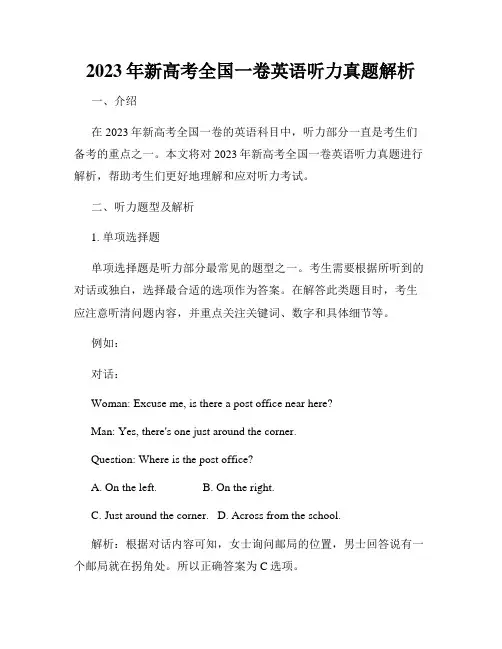
2023年新高考全国一卷英语听力真题解析一、介绍在2023年新高考全国一卷的英语科目中,听力部分一直是考生们备考的重点之一。
本文将对2023年新高考全国一卷英语听力真题进行解析,帮助考生们更好地理解和应对听力考试。
二、听力题型及解析1. 单项选择题单项选择题是听力部分最常见的题型之一。
考生需要根据所听到的对话或独白,选择最合适的选项作为答案。
在解答此类题目时,考生应注意听清问题内容,并重点关注关键词、数字和具体细节等。
例如:对话:Woman: Excuse me, is there a post office near here?Man: Yes, there's one just around the corner.Question: Where is the post office?A. On the left.B. On the right.C. Just around the corner.D. Across from the school.解析:根据对话内容可知,女士询问邮局的位置,男士回答说有一个邮局就在拐角处。
所以正确答案为C选项。
2. 填空题填空题要求考生根据所听到的对话或独白,填入适当的单词或短语,补全句子。
在解答此类题目时,考生应注意关注对话或独白的语境,理解其中的信息,并选取正确的单词或短语填空。
例如:独白:Welcome to Green Garden Hotel. If you need any help during your stay, please don't hesitate to ask our friendly staff. We have a restaurant on thefirst floor, serving delicious dishes from all over the world. Breakfast is included in the room rate, and it's served from 7:00 a.m. to 10:00 a.m. every morning.Question: The breakfast at Green Garden Hotel is served from _______to _______.解析:根据独白内容可知,早餐是从早上7点到10点供应的。
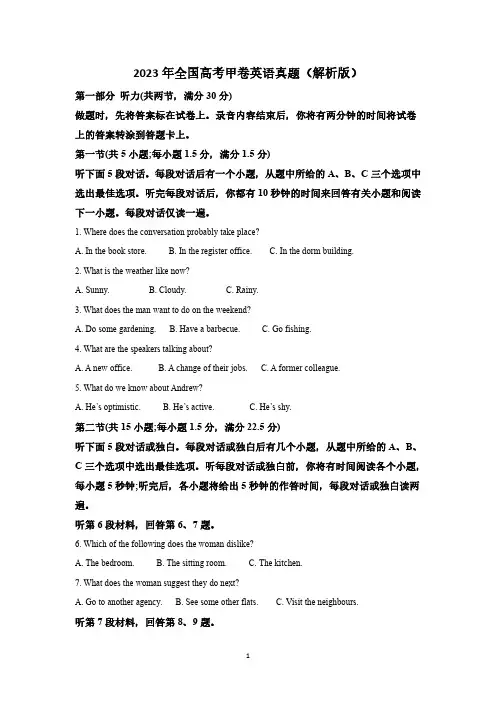
2023年全国高考甲卷英语真题(解析版)第一部分听力(共两节,满分30分)做题时,先将答案标在试卷上。
录音内容结束后,你将有两分钟的时间将试卷上的答案转涂到答题卡上。
第一节(共5小题;每小题1.5分,满分1.5分)听下面5段对话。
每段对话后有一个小题,从题中所给的A、B、C三个选项中选出最佳选项。
听完每段对话后,你都有10秒钟的时间来回答有关小题和阅读下一小题。
每段对话仅读一遍。
1.Where does the conversation probably take place?A.In the book store.B.In the register office.C.In the dorm building.2.What is the weather like now?A.Sunny.B.Cloudy.C.Rainy.3.What does the man want to do on the weekend?A.Do some gardening.B.Have a barbecue.C.Go fishing.4.What are the speakers talking about?A.A new office.B.A change of their jobs.C.A former colleague.5.What do we know about Andrew?A.He’s optimistic.B.He’s active.C.He’s shy.第二节(共15小题;每小题1.5分,满分22.5分)听下面5段对话或独白。
每段对话或独白后有几个小题,从题中所给的A、B、C三个选项中选出最佳选项。
听每段对话或独白前,你将有时间阅读各个小题,每小题5秒钟;听完后,各小题将给出5秒钟的作答时间,每段对话或独白读两遍。
听第6段材料,回答第6、7题。
6.Which of the following does the woman dislike?A.The bedroom.B.The sitting room.C.The kitchen.7.What does the woman suggest they do next?A.Go to another agency.B.See some other flats.C.Visit the neighbours.听第7段材料,回答第8、9题。
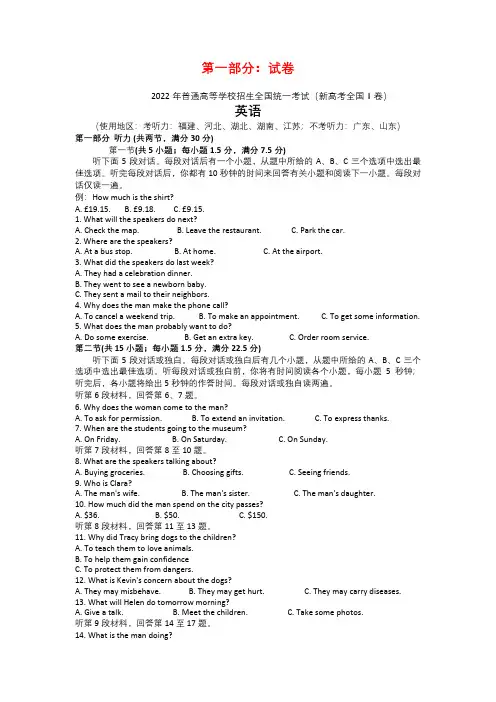
第一部分:试卷2022年普通高等学校招生全国统一考试(新高考全国Ⅰ卷)英语(使用地区:考听力:福建、河北、湖北、湖南、江苏;不考听力:广东、山东)第一部分听力 (共两节,满分30分)第一节(共5小题;每小题1.5分,满分7.5分)听下面5段对话。
每段对话后有一个小题,从题中所给的A、B、C三个选项中选出最佳选项。
听完每段对话后,你都有10秒钟的时间来回答有关小题和阅读下一小题。
每段对话仅读一遍。
例:How much is the shirt?A. £19.15.B. £9.18.C. £9.15.1. What will the speakers do next?A. Check the map.B. Leave the restaurant.C. Park the car.2. Where are the speakers?A. At a bus stop.B. At home.C. At the airport.3. What did the speakers do last week?A. They had a celebration dinner.B. They went to see a newborn baby.C. They sent a mail to their neighbors.4. Why does the man make the phone call?A. To cancel a weekend trip.B. To make an appointment.C. To get some information.5. What does the man probably want to do?A. Do some exercise.B. Get an extra key.C. Order room service.第二节(共15小题;每小题1.5分,满分22.5分)听下面5段对话或独白。
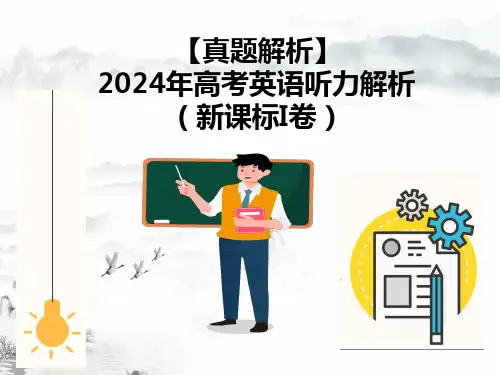
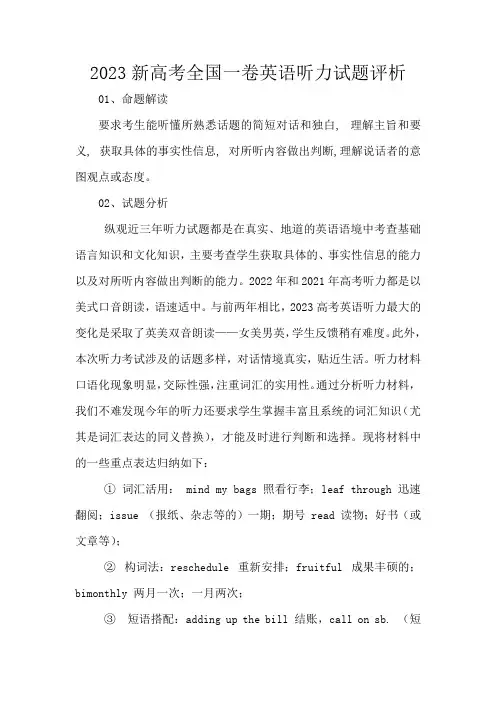
2023新高考全国一卷英语听力试题评析01、命题解读要求考生能听懂所熟悉话题的简短对话和独白, 理解主旨和要义, 获取具体的事实性信息, 对所听内容做出判断,理解说话者的意图观点或态度。
02、试题分析纵观近三年听力试题都是在真实、地道的英语语境中考查基础语言知识和文化知识,主要考查学生获取具体的、事实性信息的能力以及对所听内容做出判断的能力。
2022年和2021年高考听力都是以美式口音朗读,语速适中。
与前两年相比,2023高考英语听力最大的变化是采取了英美双音朗读——女美男英,学生反馈稍有难度。
此外,本次听力考试涉及的话题多样,对话情境真实,贴近生活。
听力材料口语化现象明显,交际性强,注重词汇的实用性。
通过分析听力材料,我们不难发现今年的听力还要求学生掌握丰富且系统的词汇知识(尤其是词汇表达的同义替换),才能及时进行判断和选择。
现将材料中的一些重点表达归纳如下:① 词汇活用: mind my bags 照看行李;leaf through 迅速翻阅;issue (报纸、杂志等的)一期;期号 read 读物;好书(或文章等);② 构词法:reschedule 重新安排;fruitful 成果丰硕的;bimonthly 两月一次;一月两次;③ 短语搭配:adding up the bill 结账,call on sb. (短时间)拜访;看望 be done with sth. 完成某事;meet deadlines 在截止日期前完成任务;fit into 适应。
03、学习建议基于今年的高考听力试卷分析,今后的英语高考复习可参考以下建议:1. 重视听力练习,意识到听力考查的灵活性和难度。
2. 丰富英语听力训练的形式,美音和英音都要坚持练习,不拘泥于一种形式。
3. 坚持每天用听力磨练耳朵,有计划地养成自己的听力策略。
4. 重视大声朗读的作用。
朗读有助于改进语音、语调,增强语感。
5. 夯实词汇基础,坚实的词汇知识才能保证听力练习时听得准,反应快。
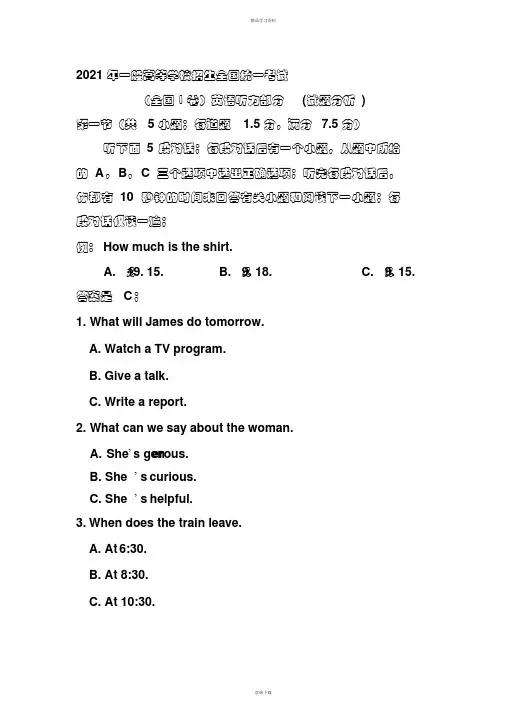
2021 年一般高等学校招生全国统一考试(全国Ⅰ卷)英语听力部分(试题分析)第一节(共 5 小题;每道题 1.5 分,满分7.5 分)听下面5 段对话;每段对话后有一个小题,从题中所给的A,B,C 三个选项中选出正确选项;听完每段对话后,你都有10 秒钟的时间来回答有关小题和阅读下一小题;每段对话仅读一遍;例:How much is the shirt.A. £19. 15.B. £9. 18.C. £9. 15. 答案是 C ;1. What will James do tomorrow.A. Watch a TV program.B. Give a talk.C. Write a report.2. What can we say about the woman.A. She’s ge e n rous.B. She ’ s curious.C. She ’ s helpful.3. When does the train leave.A. At 6:30.B. At 8:30.C. At 10:30.4. How does the woman go to work.A. By car.B. On foot.C. By bike.5. What is the probable relationship between the speakers.A. Classmates.B. Teacher and student.C. Doctor and patient.其次节(共15 小题;每道题 1.5 分,满分22.5 分)听下面 5 段对话或独白;每段对话或独白后有几个小题,从题中所给的 A ,B,C 三个选项中选出正确选项;听每段对话或独白前,你将有时间阅读各个小题,每道题 5 秒钟;听完后,各小题将给出 5 秒钟的作答时间;每段对话或独白读两遍;听第 6 段材料,回答第6,7 题;6. What does the woman regret.A. Giving up her research.B. Dropping out of college.C. Changing her major.7. What is the woman interested in studying now.A. Ecology.B. Education.C. Chemistry.听第7 段材料,回答第8,9 题;8. What is the man.A. A hotel manager.B. A tour guide.C. A taxi driver.9. What is the man doing for the woman.A. Looking for some local foods.B. Showing her around the seaside.C. Offering information about a hotel.听第8 段材料,回答第10 至12 题;10. Where does the conversation probably take place.A. In an office.B. At home.C. At a restaurant.11. What will the speakers do tomorrow evening.A. Go to a concert.B. Visit a friend.C. Work extra hours.12. Who is Alice going to call.A. Mike.B. Joan.C. Catherine.听第9 段材料,回答第13 至16 题;13. Why does the woman meet the man.A. To look at an apartment.B. To deliver some furniture.C. To have a meal together.14. What does the woman like about the carpet.A. Its color.B. Its design.C. Its quality.15. What does the man say about the kitchen.A. It ’ s a good size.B. It ’ s newly painted.C. It ’ s adequately equipped.16. What will the woman probably do next.A. Go downtown.B. Talk with her friend.C. Make payment.听第10 段材料,回答第17 至20 题;17. Who is the speaker probably talking to.A. Movie fans.B. News reporters.C. College students.18. When did the speaker take English classes.A. Before he left his hometown.B. After he came to America.C. When he was 15 years old.19. How does the speaker feel about his teacher.A. He ’ s proud.B. He ’ s sympathetic.C. He ’ s grateful.20. What does the speaker mainly talk about.A. How education shaped his life.B. How his language skills improved.C. How he managed his business well.录音稿(Text 1)W: James, you ’ ve been watching TV for the whole evening.What’ s on.M: It ’ s a science program on the origin of the universe. I give a presentation on it in my class tomorrow.(Text 2)M: Hello, do you have The Best of Mozart.W: Um, sorry. We ’ ve just sold out, but we can order one for you. If you give us your number, we ’ ll call you when the CD arrives.(Text 3)W: We’ d better be going now, or we ’ ll be late for the train. M: No rush. It ’ s 8:30 now. We still have two hours.(Text 4)M: I am so tired of driving all those hours to work.W: Yeah, I know what you mean. I used to drive two hours to work each way. But now I live within walking distanceof my office. I don ’ t even need a bike.(Text 5)W: Hi Andy. I didn ’s t ee you in Professor Smith ’s c lass yesterday. What happened.M: Well, I had a headache, so I called him and asked for sick leave.(Text 6)W: The biggest mistake I made, uh, was leaving college in my last year, and not completing my education. So I ’mthinking of going back to school.M: School. To study what.W: Ecology. I ’minterested in the relationship betweenhumans and nature.M: Cool. Is it what you studied years ago.W: No, I majored in chemistry then.(Text 7)M: Good morning, madam. I ’m your guide for this p.triW: How lovely. Could you tell me about the hotel I ’ m going to stay at.M: Yes, of course. The Grand Hotel opened in 1990 and it sits on the seaside along the South Coast Highway. It isthe most beautiful hotel here.W: That sounds great.M: And there are some restaurants outside. So at dinner time, you ’ d have a lot of choices.W: That ’ s really nice. I like t o have some local foods while traveling. What about the scenery around it.M: The hotel has the best views of the Pacific Ocean.W: Oh, I think I will love this hotel.(Text 8)W: Hi, Mike.M: Hi, Alice. Nice to see you. You don ’ t often come here.W: I usually have fast food delivered to my office. Just came here for a change today.M: The environment here is good, clean and relatively quiet.W: Yeah, and I heard the food is tasty. By the way, are yougoing to the concert tomorrow evening.M: Yes. Are you.W: Yeah, Catherine was supposed to go with me, but she may have to work extra hours tomorrow. Do you knowanyone who might like to go.M: No. But if you like, I can ask around. Er, Joan might want to go.W: Oh, yes, she is a great fan of classical music. I ’ ll givea ring after lunch.(Text 9)W: Hi, I ’ ve only just arrived.M: Oh, good. Now here are the keys. Let ’ s go in. There are two apartments. The one for rent is on the right. Docome in.W: Thank you. I like the carpet. The color is nice, isn ’t M: Yes, and this apartment is in good condition. Here is yourlounge.W: Where would we eat.M: There is this corner here, or you can use your kitchen.Come and see.W: The kitchen is quite small.M: Yes, but it has everything, cooker, fridge, even a dishwasher.W: And there are lots of cupboards.M: Let me show you the bedrooms. This is the smaller one. W: It ’ s a good size, though.M: Now come into the other bedroom. You can see the bathroom, too.W: Yes, it is very nice. But I will have to ask my friend first, and we will come together. I understand it is $800 a month.M: Yes, but a few blocks downtown would be much more expensive.W: Well, thank you. I will be in touch.(Text 10)M: Thank you very much. Thank you Dr. Johnson. Well, it is really great to be back at university again. The thing thatI want to tell you today is this: education is important.When I came to the U.S., I was only thinking about beinga carpenter, but I could not read the newspaper and Icould not understand the news on television or movies or anything like this, so I entered the city college to takeEnglish classes for foreign students. I was very proud that I was going to a college because no one in my family ever went to any college or to any university. You know, when you are 15 years old in my country, you finish school and then you learn a trade. And that ’esxactly what I did. When I was 15 years old, I learned how to bea carpenter. A year later, I came to America. Luckily, Imet a very good teacher who encouraged me to take some math classes, b usiness classes a nd history classes and I became a full-time college student. And today whenI look back, I ’m so happ ay u s b e ec y ou never know wherelife will take you. All of a sudden, I started making money, because I was really good at m ath. You know, how to work out everything with math is so important.This is something that I learned when I started my ownbusiness, which is doing really well.2021 年一般高等学校招生全国统一考试(全国I 卷)英语试题听力部分参考答案1. B2. C3. C4. B5. A6. B7. A8. B9. C 10. C11. A 12. B 13. A 14. A 15. C16. B 17. C 18. B 19. C 20. A〖解密〗2021 年高考英语全国I 卷听力试题简析1. 语速:143 词/分(比2021 年每分钟慢25 词)2. 录音稿总词数:843(比2021 年少51 词)3. 腔调:美音(没变)4. 录音人:Kris Chung, Laura Estelles (女声变化)详见以下统计:考点统计表猎取事实性的对所听内容作懂得说话者的年份懂得主旨和要义具体信息出简洁推断意图,观点和态度2021 1 12 6 12021 1 13 5 1录音数据统计表词数累计时间平均语速年份第一节其次节合计(一遍)(词/分2021 157 686 843 5′53″143 2021 173 721 894 5′19″168话题统计表第一节其次节年份Text Text Text Text Text Text Text Text Text Te1 2 3 4 5 6 7 8 9 10看电2021视赶火买CD车上班上课交通缺席教介绍餐馆复学看房的旅社偶遇要去法Juá评判2021电影国预备借阅的计聚会图书明白查找火车修鞋时间店铺商定去德餐馆的见面国工点餐热时间作划气答案分布表答案总数分布年份答案邻近分布A B CB C C B A BA B C C2021 6 7 7A B A A C B C B C AC A C B A C A B C B2021 7 6 7B C A B A B C A C A〖解密〗2021 年高考英语全国I 卷听力试题具体分析注:蓝色标记为对比往年新增分析角度听力部分要求考生听懂有关日常生活中所熟识的话题,如:看电视,买CD ,赶火车,上班交通,上课缺席,复学,介绍旅社,餐馆偶遇,看房,谈训练的重要性;与往常相同,听力部分中有10 段听力材料,其中的 5 段较短,另 5 段就较长;话题掩盖面广,对话内容规律清晰,话语流畅;所考查的听力微技能包括:懂得主旨和要义,猎取事实性的具体信息,对所听内容作出简洁推断,懂得谈话人的意图,观点和态度;问题涉及多个方面,多个角度,采纳where-, when-, why-, how-, what- 等多种特别疑问句;录音人:男:Kris Chung; 女: Laura Estelles口音:美音词数:843时间:5 分53 秒语速:143 词/分难度:难度整体与2021 年持平考点:2021 年全国I 卷高考英语听力的20 个小题中,考查懂得主旨与要义的 1 个题,猎取事实性的具体信息的12 个题,对所听内容作出推断的 6 个题,懂得说话者的意图,观点和态度的 1 个题,较好地表达了考试大纲和考试说明对考生的要求;第一节(Text 1)W: James, you ’ve been watchin T g V for the whole evening.What’ s on.M: It ’ s a science program on the origin of the universe. I give a presentation on it in my class tomorrow.(词数:31;时间:13″;语速:143 词/分)1. What will James do tomorrow.A. Watch a TV program.B. Give a talk.C. Write a report.【分析】考查考生猎取事实性具体信息的才能;由最后一句I ’llgive a presentation on it in my class tomorrow. 可知答案;give a presentation 与选项give a talk同义互换;【答案】B【语言学问】1. the origin of ⋯的起源2. give a presentation 作报告【语音】连读James, you ’ ve been watching TV f o h r e t whole evening.I ’ll v g e i a presentation on it in my class tomorrow.(Text 2)M: Hello, do you have The Best of Mozart.W: Um , sorry. We ’ ve just sold out, but we can order one for you. If you give us your number, we ’ ll call you when the CD arrives.(词数:34 ;时间:14″;语速:146 词/分)2. What can we say about the woman.A. She’ s generous.B. She ’ s curious.C. She ’ s helpful.【分析】考查考生对所听内容作出简洁推断的才能;女士说男士想要的CD 刚卖完,假如男士想预订的话,可以留下电话号码,CD 到货之后会通知他;由此可见,女士是乐于助人的;【答案】C【语言学问】sell out 卖光;脱销(Text 3)W: We’ d better begoing now, or we ’ ll be late for the train. M: No rush. It ’ s 8:30 now. We still have two hours.(词数:22;时间:9″;语速:147 词/分)3. When does the train leave.A. At 6:30.B. At 8:30.C. At 10:30.【分析】考查考生猎取事实性具体信息的才能;由男士的话It ’s 8:30 now. We still have two hours. 可知火车10:30 动身;【答案】C【语言学问】no rush 不用急(Text 4)M: I am so tired of driving all those hours to work.W: Yeah, I know what you mean. I used to drive two hours to work each way. But now I live within walking distance of my office. I don ’t even need a bike.(词数:43;时间:17″;语速:152 词/分)4. How does the woman go to work.A. By car.B. On foot.C. By bike.【分析】考查考生猎取事实性具体信息的才能;女士说她家离工作地点很近,走着就到了,甚至连自行车都不用,由此可知女士步行去上班;【点拨】此题难点在于对within walking distance of 的懂得,其义为“(距离⋯)很近,走着就到了”;【答案】B【语言学问】within walking distance (of sth) (距离⋯)很近,走着就到了【语音】重读I used to drive two hours to work each way, but now I live within walking distance of my office.(Text 5)W: Hi Andy. I didn ’s t ee you in Professor Smith ’s c lass yesterday. What happened.M: Well, I had a headache, so I called him and asked for sick leave.(词数:27;时间:12″;语速:135 词/分)5. What is the probable relationship between the speakers.A. Classmates.B. Teacher and student.C. Doctor and patient.【分析】考查考生对所听内容作出简洁推断的才能;由女士的话I didn’t s ee you in Professor Smith’sclass yesterday.可知他们是同班同学;【答案】A【语言学问】ask for sick leave 请病假W: The biggest mistake I made, uh, was leaving college inmy last year, and not completing my education. So I ’ m thinking of going back to school. M: School. To study what. W: Ecology. I ’ minterestedin humans and nature.the relationship betweenM: Cool. Is it what you studied years ago. W: No, I majored in chemistry then.(词数: 54;时间: 27″;语速: 120 词/分)其次节听第 6 段材料,回答第 6,7 题; (Text 6)材料内容为复学;主要是女士懊悔辍学而想返校学习; 6. What does the woman regret.A. Giving up her research.B. Dropping out of college.C. Changing her major.【分析】考查考生猎取事实性具体信息的才能;由 女 士 所 说 的 The biggest mistake I made, uh, was leaving college in my last year, and not completing my education. 可知,女士很懊悔中途辍学,没有完成学业;【点拨】题干中的 regret 与材料中的 the biggest mistake 呼应, B 选项中的 drop out of college 与材料中的 leaving college in my last year, and not completing my education 呼应; 【答案】 B7. What is the woman interested in studying now.A. Ecology.B. Education.C. Chemistry.【分析】考查考生猎取事实性具体信息的才能;男士问女士回学校想学什么,女士回答生态学,然后说她对人类与自然的关系很感爱好,由此可知,女士现在对学习生态学感爱好; 【答案】 A听第 7 段材料,回答第 8,9 题; (Text 7)’ m goingM: Good morning, madam. I’ m your guide for this trip.W: How lovely. Could you tell me about the hotel Ito stay at.M: Yes, of course. The Grand Hotel opened in 1990 and itsits on the seaside along the South Coast Highway. It is the most beautiful hotel here.W: That sounds great.M: And there are some restaurants outside. So at dinner time, you ’ d have a lot of choices.W: That ’s really nice. I like to have some local foods while traveling. What about the scenery around it.M: The hotel has the best views of the Pacific Ocean.W: Oh, I think I will love this hotel.(词数:105;时间:45″;语速:140 词/分)材料内容为导游介绍旅社相关情形;8. What is the man.A. A hotel manager.B. A tour guide.C. A taxi driver.【分析】考查考生猎取事实性具体信息的才能;由男士所说的I ’m your guide for this trip. 可知男士是一名导游;【答案】B9. What is the man doing for the woman.A. Looking for some local foods.B. Showing her around the seaside.C. Offering information about a hotel.【分析】考查考生猎取事实性具体信息的才能;由女士所说的Could you tell me about the hotel I ’m going to stay at. 以及最终女士所说的Oh, I think I will love this hotel.可知,男士在给女士介绍旅社的相关情形;【答案】C【语音】1. 意群与停顿The Grand Hotel opened in 1990 | and it sits on the seaside| along the South Coast Highway.2. 弱读I like to have some l ocal foods while traveling.听第8 段材料,回答第10 至12 题;(Text 8)W: Hi, Mike.M: Hi, Alice. Nice to see you. You don’t often come here.W: I usually have fast food delivered to my office. Just came here for a change today.M: The environment here is good, clean and relatively quiet.W: Yeah, and I heard the food is tasty. By the way, are you going to the concert tomorrow evening.M: Yes. Are you.W: Yeah, Catherine was supposed to go with me, but she may have to work extra hours tomorrow. Do you know anyone who might like to go.M: No. But if you like, I can ask around. Er, Joan might want to go.W: Oh, yes, she is a great fan of classical music. I ’l l give hera ring after lunch.(词数:117;时间:49″;语速:143 词/分)材料内容为餐馆偶遇小谈;10. Where does the conversation probably take place.A. In an office.B. At home.C. At a restaurant.【分析】考查考生对所听内容作出简洁推断的才能;男士遇到女士说You don’t often come here.而女士回答说她通常是叫外卖,今日只是想换换口味,而且女士接着说她听说这儿食物很好吃,由此可知他们是在餐馆偶遇;【答案】C11. What will the speakers do tomorrow evening.A. Go to a concert.B. Visit a friend.C. Work extra hours.【分析】考查考生猎取事实性具体信息的才能;女士问男士明晚是否去参与音乐会,男士给与了确定回答并问女士是否也去,女士也给出了确定答案,可知他们明晚都会去参与音乐会;【答案】A12. Who is Alice going to call.A. Mike.B. Joan.C. Catherine.【分析】考查考生猎取事实性具体信息的才能;男士说Joan 可能想去参与音乐会,然后女士说Oh, yes, she is a great fan of classical music. I ’ll give her a ring after lunch. 可知Alice 准备给Joan 打电话;【答案】B【语言学问】relatively adv 比较而言;相对地be supposed to do sth应当做某事give sb a ring 给某人打电话【语音】1. 失去爆破I usually have fast foo(d) deliver(ed) to my office.2. 连读But if you like, I ca n ask around.She is a great fan of classical music.听第9 段材料,回答第13 至16 题;(Text 9)W: Hi, I ’ve only just arriv. edM: Oh, good. Now here are the keys. Let ’ s go in. There are two apartments. The one for rent is on the right. Docome in.W: Thank you. I like the carpet. T he color is nice, isn ’ t it. M: Yes, and this apartment is in good condition. Here is your lounge.W: Where would we eat.M: There is this corner here, or you can use your kitchen.Come and see.W: The kitchen is quite small.M: Yes, but it has everything, cooker, fridge, even a dishwasher.W: And there are lots of cupboards.M: Let me show you the bedrooms. This is the smaller one.W: It ’ s a good size, though.M: Now come into the other bedroom. You can see the bathroom, too.W: Yes, it is very nice. But I will have to ask my friend first, and we will come together. I understand it is $800 a month.M: Yes, but a few blocks downtown would be much more expensive.W: Well, thank you. I will be in touch.(词数:167 时间:1′16″语速:132 词/分)材料内容是租房子;主要是男士给女士介绍要出租的房子;13. Why does the woman meet the man.A. To look at an apartment.B. To deliver some furniture.C. To have a meal together.【分析】考查考生对所听内容作出简洁推断的才能;男士说There are two apartments, the one for rent is on the right. 而且下文接着谈论房子里的各种设施,可以推断女士来见男士是要看房;【答案】A14. What does the woman like about the carpet.A. Its color.B. Its design.C. Its quality.【分析】考查考生猎取事实性具体信息的才能;可知’她t i t喜. 女士说I like the carpet. The color is nice, isn欢地毯的颜色;【答案】A15. What does the man say about the kitchen.A. It ’s a goi o z d e.sB. It ’ s newly painted.C. It ’ s adequately equipped.【分析】考查考生猎取事实性具体信息的才能;男士说it has everything, cooker, fridge, even a dishwasher,说明他认为厨房设施配备齐全;【答案】C16. What will the woman probably do next.A. Go downtown.B. Talk with her friend.C. Make payment.【分析】考查考生对所听内容作出简洁推断的才能;看完房子后女士说她要和伴侣商议一下,由此可以推断她接下来要和她的伴侣谈;【答案】B【语言学问】in good condition 状况良好a good size 相当大be in touch 保持联系【语音】1. 连读Let ’s g o (w)i n.Now come into the (j)other bedroom. ( 同时留意the 在元音前的发音)2. 失去爆破Yes, an(d) this apartment is in goo(d) condition.3. 语调There is this corner here, or you can use your kitchen.听第10 段材料,回答第17 至20 题;(Text 10)M :Thank you very much. Thank you Dr. Johnson. Well, it is really great to be back at university again. The thing that I want to tell you today is this: education is important. When I came to the U.S., I was onlythinking about being a carpenter, but I could not read the newspaper and I could not understand the news on television or movies or anything like this, so I entered the city college to take English classes for foreign students. I was very proud that I was going to a college because no one in my family ever went to any college or to anyuniversity. You know, when you are 15 years old in my country, you finish school and then you learn a trade. And that’s exactly what I did. When I was 15 years old, I learned how to be a carpenter. A year later, I came to America. Luckily, I met a very good teacher who encouraged me to take some m ath classes, business classes a nd history classesand I became a full-time college student. And today when I look back, I ’m so happy because you never know where life will take you. All of a sudden, I started making money, because I was really good at math. You know, how to work out everything with math is so important. This is something that I learned when I started my own business, which is doing really well.(词数:243;时间:1′31″;语速:160 词/分)材料内容主要涉及训练;说话者通过介绍自己的个人经受告知我们训练的重要性;17. Who is the speaker probably talking to.A. Movie fans.B. News reporters.C. College students.【分析】考查考生对所听的内容作出简洁推断的才能;说话者演讲之初就说Well, it is really great to be back atuniversity again. The thing that I want to tell you today isthis: education is important ,由此可以推断他是回到高校面向同学们演讲;【答案】C18. When did the speaker take English classes.A. Before he left his hometown.B. After he came to America.C. When he was 15 years old.【分析】考查考生猎取事实性具体信息的才能;说话者说他来到美国,不会读报,看不了电视新闻,也看不懂电影,因此他进入高校学习面对外国同学开设的英语课,由此可知他是来到美国后开头上英语课;【答案】B19. How does the speaker feel about his teacher.A. He ’ s proud.B. He ’ s sympathetic.C. He ’ s grateful.【分析】考查考生对说话者观点的懂得才能;由Luckily, I met a very good teacher who encouraged me to take some ...可知说话者很感恩遇到这样的一位老师;【答案】C20. What does the speaker mainly talk about.A. How education shaped his life.B. How his language skills improved.精品学习资料C. How he managed his business well.【分析】考查考生懂得主旨与要义的才能;说话者在一开头就强调训练很重要,然后谈及自身的经受,最终提及训练给自己的人生带来的变化,可知说话者主要是在谈论训练对其人生的影响;【答案】A【语言学问】trade n (尤指手工)职业;手艺;行当look back 回首(往事);回忆all of a sudden 突然;猛地work out 解决;把⋯弄清晰;算出【语音】1. 意群与停顿+ 失去爆破When I came to the U.S., | I was only thinking about being a carpenter, | but I coul(d) no(t) rea(d) the newspaper | and I coul(d) not understand(d) the news on television | or movies or anything like this, | so I enter (ed) the city college to take English classes for foreign students.2. 意群与停顿You know, when you are 15 years old in my country, | you finish school | and then you learn a trade.欢迎下载。
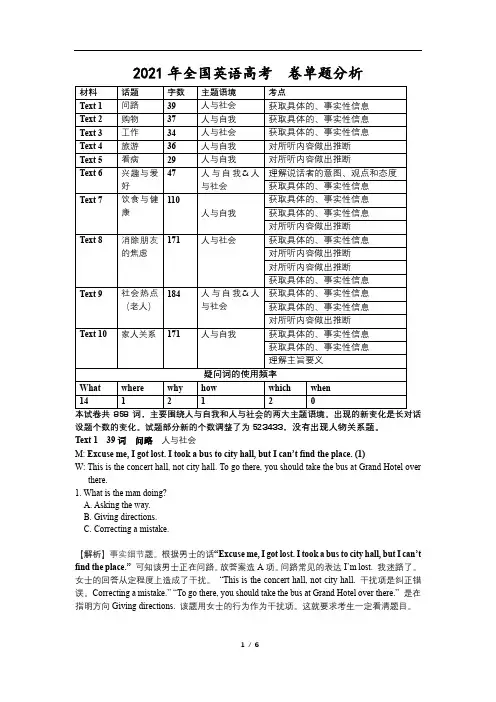
2021年全国英语高考甲卷单题分析设题个数的变化。
试题部分新的个数调整了为523433,没有出现人物关系题。
Text 1 39词问路人与社会M: Excuse me, I got lost. I took a bus to city hall, but I can’t find the place. (1)W: This is the concert hall, not city hall. To go there, you should take the bus at Grand Hotel over there.1. What is the man doing?A. Asking the way.B. Giving directions.C. Correcting a mistake.【解析】事实细节题。
根据男士的话“Excuse me, I got lost. I took a bus to city hall, but I can’t find the place.” 可知该男士正在问路。
故答案选A项。
问路常见的表达I’m lost. 我迷路了。
女士的回答从定程度上造成了干扰。
“This is the concert hall, not city hall. 干扰项是纠正错误。
Correcting a mistake.” “To go there, you should take the bus at Grand Hotel over there.” 是在指明方向Giving directions. 该题用女士的行为作为干扰项。
这就要求考生一定看清题目。
Text 2 37词购物人与自我M: Can I help you?W: I’m looking for a size twelve dress. (2)M: Oh, let me see. An eight, a ten. Ah, you’re lucky. I have the prettiest dress here in a twelve. Why don’t you try it on?2. What dress size does the woman want?A. 8.B. 10.C. 12.【解析】事实细节题。
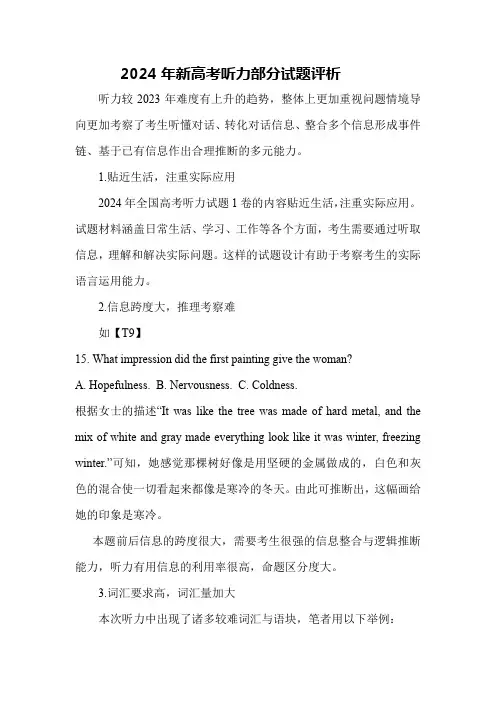
2024年新高考听力部分试题评析听力较2023年难度有上升的趋势,整体上更加重视问题情境导向更加考察了考生听懂对话、转化对话信息、整合多个信息形成事件链、基于已有信息作出合理推断的多元能力。
1.贴近生活,注重实际应用2024年全国高考听力试题1卷的内容贴近生活,注重实际应用。
试题材料涵盖日常生活、学习、工作等各个方面,考生需要通过听取信息,理解和解决实际问题。
这样的试题设计有助于考察考生的实际语言运用能力。
2.信息跨度大,推理考察难如【T9】15.What impression did the first painting give the woman?A.Hopefulness.B.Nervousness.C.Coldness.根据女士的描述“It was like the tree was made of hard metal, and the mix of white and gray made everything look like it was winter, freezing winter.”可知,她感觉那棵树好像是用坚硬的金属做成的,白色和灰色的混合使一切看起来都像是寒冷的冬天。
由此可推断出,这幅画给她的印象是寒冷。
本题前后信息的跨度很大,需要考生很强的信息整合与逻辑推断能力,听力有用信息的利用率很高,命题区分度大。
3.词汇要求高,词汇量加大本次听力中出现了诸多较难词汇与语块,笔者用以下举例:Text 5焦虑M: All well,Sophie?W:Hmm. Not great. I’m just so down with writing this report.M: Are you almost done with it?W: Far from it. And I’ll get it represented in class tomorrow.Text 8为戏剧制作服装M:(10)Linda, you work on plays and shows but you are not on stage. What do you do?W:(10)I’m a costume designer. I have the actors become their characters. M: Is it a kind of, like, playing dresser?Text 9分享艺术展观感W: Hi Kevin. I’ve just got back from the Art Gallery. There’s a wonderful show of abstract art. You should have come with me.M:(14)I don’t know. Abstract art seems like children’s painting to me. Text 10早间新闻播报M: You are watching the morning news. This is Steven Johnson. Sydney and the New South Wales coast have been hit by heavy rains. Major roads, the airport, trains and buses were all thrown behind the schedule as more than a month’s worth of rain fell in just one hour during the morning rush. 由上述可知,本次听力文本中词汇语块的难度有所提高,甚至出现了“thrown behind the schedule, a month’s worth of rain ”这样考生并不熟悉的表达,尽管对解题影响不大,但也启示我们要刻意积累口语中的常用表达。
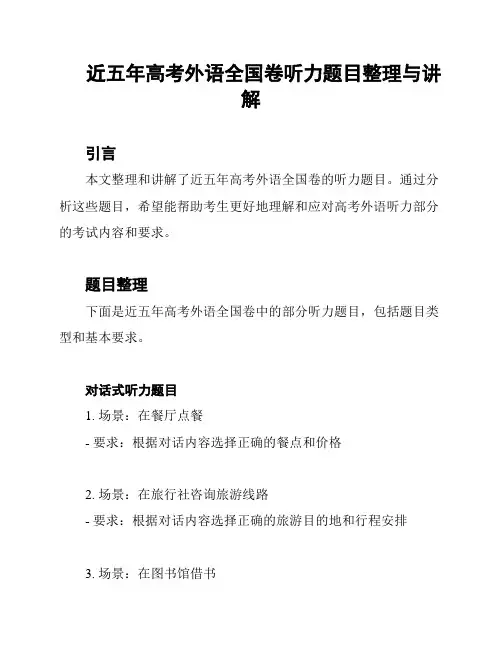
近五年高考外语全国卷听力题目整理与讲
解
引言
本文整理和讲解了近五年高考外语全国卷的听力题目。
通过分析这些题目,希望能帮助考生更好地理解和应对高考外语听力部分的考试内容和要求。
题目整理
下面是近五年高考外语全国卷中的部分听力题目,包括题目类型和基本要求。
对话式听力题目
1. 场景:在餐厅点餐
- 要求:根据对话内容选择正确的餐点和价格
2. 场景:在旅行社咨询旅游线路
- 要求:根据对话内容选择正确的旅游目的地和行程安排
3. 场景:在图书馆借书
- 要求:根据对话内容选择正确的借书流程和借书卡要求
短文理解题目
1. 题目类型:听新闻报道
- 要求:听短文后回答相关的问题,如主题、时间、地点等
2. 题目类型:听讲座
- 要求:听短文后回答相关的问题,如演讲者、演讲内容等
3. 题目类型:听导游介绍
- 要求:听短文后回答相关的问题,如景点特色、参观顺序等
讲解和备考建议
1. 注意听力技巧:在考试过程中,要学会抓住关键词,注意细节信息,并熟练掌握常见的听力表达方式。
2. 多做模拟训练:通过做各种模拟题,可以提高对不同题型的理解和应对能力。
3. 提高听力速度和准确度:多听英语材料,培养对语速和语调的敏感性,提高听力速度和准确度。
总结
通过对近五年高考外语全国卷听力题目的整理和讲解,希望能帮助考生了解题目类型和要求,并提供备考建议。
考生可以通过多做模拟题和提高听力技巧,提高应对高考外语听力部分的能力,取得更好的成绩。
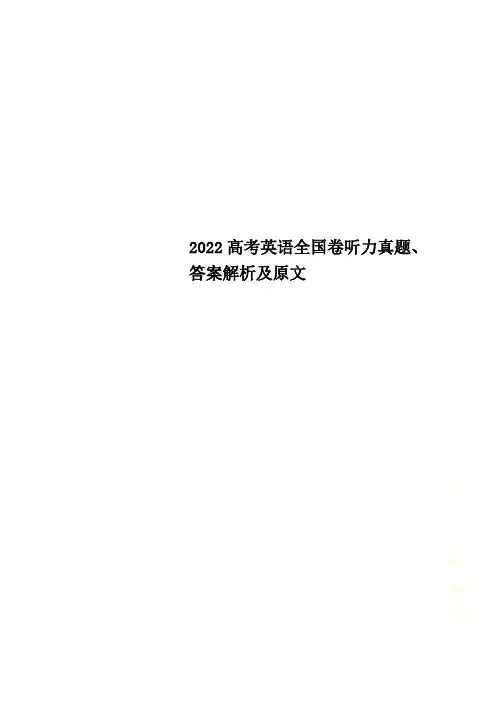
2022高考英语全国卷听力真题、答案解析及原文听力试题:第一局部听力(共两节,总分值30分)做题时,先将答案标在试卷上。
录音内容结束后,你将有两分钟的时间将试卷上的答案转涂到答题卡上。
第一节(共5小题:每题1.5分,总分值7.5分)听下面5段对话。
每段对话后有一个小题.从题中所给的A. B.C三个选项中选出最正确选项,并标在试卷的相应位置。
听完每段对话后,你都有10秒钟的时间来答复有关小题和阅读下一小题。
每段对话仅读一遍。
例:How much is the shirt?A.£19.15.B.£9.15.C. £9.18.答案是B。
1. Where does this conversation probably take place?A.In a bookstore.B. In a classroom.C. In a library.2.At what time will the film begin?A.7:20B.7:15C.7:003. What are the two speakers mainly talking about?A. Their friend Jane.B. A weekend trip.C. A radio programme.4. What will the woman probably do?A. Catch a train.B. See the man off.C. Go shopping.5. Why did the woman apologize?A. She made a late delivery.B. She went to the wrong place.C. She couldn't take the cake back.B. Quite satisfactory.C. A bit disappointing.9. What was the 15% on the bill paid for?A. The food.B. The drinks.C. The service.听第8段材料,答复第I0至12题。
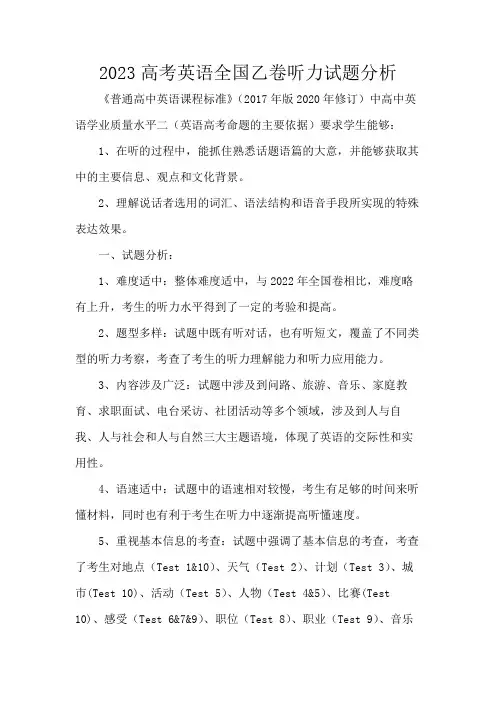
2023高考英语全国乙卷听力试题分析《普通高中英语课程标准》(2017年版2020年修订)中高中英语学业质量水平二(英语高考命题的主要依据)要求学生能够:1、在听的过程中,能抓住熟悉话题语篇的大意,并能够获取其中的主要信息、观点和文化背景。
2、理解说话者选用的词汇、语法结构和语音手段所实现的特殊表达效果。
一、试题分析:1、难度适中:整体难度适中,与2022年全国卷相比,难度略有上升,考生的听力水平得到了一定的考验和提高。
2、题型多样:试题中既有听对话,也有听短文,覆盖了不同类型的听力考察,考查了考生的听力理解能力和听力应用能力。
3、内容涉及广泛:试题中涉及到问路、旅游、音乐、家庭教育、求职面试、电台采访、社团活动等多个领域,涉及到人与自我、人与社会和人与自然三大主题语境,体现了英语的交际性和实用性。
4、语速适中:试题中的语速相对较慢,考生有足够的时间来听懂材料,同时也有利于考生在听力中逐渐提高听懂速度。
5、重视基本信息的考查:试题中强调了基本信息的考查,考查了考生对地点(Test 1&10)、天气(Test 2)、计划(Test 3)、城市(Test 10)、活动(Test 5)、人物(Test 4&5)、比赛(Test 10)、感受(Test 6&7&9)、职位(Test 8)、职业(Test 9)、音乐类型(Test 10)、自我表达(Test 8)、自我分析(Test 8)等基本信息的听力理解能力。
6、考查细节信息的能力:试题中还注重考查考生对材料中的重点信息和细节信息的理解,这对于提高考生的听力水平和应试能力也非常有帮助。
具体分析如下:Text 1 32词问路W: Could you please tell me how I can get to the student dorm building?M: Sure. Turn left when you walk out of this register office, pass the bookstore and you’ll see it.重点词汇:register office 登记处问题1考查考生获取事实性具体信息的能力。
2023年高考英语真题听力原文及译文(全国1/2卷)Text 1 周末计划W: Jack, are you going camping with your friends this weekend?M: It depends. If it’s sunny, we’ll go.W: The weatherman says it’s going to rain.M: In that case, we’ll go to the cinema instead.W:杰克,你这个周末和朋友们去野营吗?M:这得看情况。
如果天晴,我们就去。
W:天气预报说会下雨。
M:那样的话,我们就去电影院。
Text 2 求助W: Excuse me, could you mind my bags for a moment? I want to buy some food at the convenience store.M: No problem. But be quick. It was announced that my train will arrive in 10 minutes.W:不好意思,请你帮我照看一下行李袋好吗?我要去便利店买点食物。
M:没问题。
但是请快一点。
车站刚刚通知我的火车将在10分钟后到达。
Text 3 计划与安排W: Mark came out of hospital last Friday. Have you got a chance to visit him?M: I plan to see him this Saturday.W: Aren’t you going to the conference then?M: No. It has been rescheduled for next Monday.W:鲍勃上星期五出院了。
你有机会去看望他吗?M:我计划这个星期六去看他。
W:那你这个星期天不去参加会议了吗?M:不去了。
2023年高考英语新课标I卷听力真题及答案Introduction:本文将为大家提供2023年高考英语新课标I卷听力真题及答案。
以下是听力部分的真题及答案解析。
Section 1:Text 1:W: Could you please tell me where the nearest post office is?M: Sure. Walk straight ahead for two blocks, and you will see it on your left-hand side.Q: Where is the post office?答案解析:根据听力材料可知,男士告诉女士的指路方向是直走两个街区,在左手边能看到邮局。
所以正确答案是:on the left-hand side。
Section 2:Text 2:M: Did you attend Maria's birthday party last night, Lisa?W: Yes, it was great. We had so much fun, and the cake was delicious as well.Q: What do we learn from the conversation?答案解析:从对话中可以得知,Lisa参加了Maria的生日派对,而且对派对表示很开心,还提到了蛋糕很美味。
根据这些信息,我们可以推断出他们度过了愉快的时光,所以正确答案是:They had a great time.Section 3:Text 3:W: Excuse me, can you tell me where the library is?M: Sure. Walk down this street until you reach the traffic lights. Turn left and the library is just opposite the park.Q: Where is the library?答案解析:由对话内容可知,男士告诉女士沿着这条街走,直到红绿灯处拐左,在公园对面可以找到图书馆。
2024年高考全国甲卷英语试题(含解析)(适用地区:陕西、宁夏、青海、内蒙古、四川、西藏)第一部分听力(共两节, 满分30分)第一节(共5小题; 每小题1. 5分, 满分7. 5分)听下面5段对话。
每段对话后有一个小题, 从题中所给的A、B、C三个选项中选出最佳选项。
听完每段对话后, 你都有10秒钟的时间来回答有关小题和阅读下一小题。
每段对话仅读一遍。
1. Where are the speakers going?A. A new restaurant.B. A convenience store.C. Their office.2. When is the class presentation according to Vicky?A. On Thursday.B. On Wednesday.C. On Tuesday.3. Why does the woman make the call?A. To check the price.B. To make an apology.C. To cancel her order.4. What is the probable relationship between the speakers?A. Husband and wife.B. Boss and employee.C. Salesperson and customer.5. What are the speakers mainly talking about?A. Their move to a new place.B. Tom's friends at school.C. A sports center.第二节(共15小题; 每小题1. 5分, 满分22. 5分)听下面5段对话或独白。
每段对话或独白后有几个小题, 从题中所给的A、B、C三个选项中选出最佳选项。
听每段对话或独白前, 你将有时间阅读各个小题, 每小题5秒钟; 听完后, 各小题将给出5秒钟的作答时间。
2018年普通高等学校招生全国统一考试(全国Ⅰ卷)英语听力部分(试题分析)第一节(共5小题;每小题分,满分分)听下面5段对话。
每段对话后有一个小题,从题中所给的A、B、C三个选项中选出最佳选项。
听完每段对话后,你都有10秒钟的时间来回答有关小题和阅读下一小题。
每段对话仅读一遍。
例:How much is the shirt?A. £19. 15.B. £9. 18.C. £9. 15.答案是C。
1.What will James do tomorrow?A. Watch a TV program.B. Give a talk.C. Write a report.2.What can we say about the woman?A.She’s generous.B. She’s curious.C. She’s helpful.3.When does the train leave?A.At 6:30.B. At 8:30.C. At 10:30.4.How does the woman go to work?A.By car.B. On foot.C. By bike.5.What is the probable relationship between the speakers?A.Classmates.B.Teacher and student.C. Doctor and patient.第二节(共15小题;每小题分,满分分)听下面5段对话或独白。
每段对话或独白后有几个小题,从题中所给的A、B、C三个选项中选出最佳选项。
听每段对话或独白前,你将有时间阅读各个小题,每小题5秒钟;听完后,各小题将给出5秒钟的作答时间。
每段对话或独白读两遍。
听第6段材料,回答第6、7题。
6. What does the woman regret?A. Giving up her research.B. Dropping out of college.C. Changing her major.7. What is the woman interested in studying now?A. Ecology.B. Education.C. Chemistry.听第7段材料,回答第8、9题。
8. What is the man?A. A hotel manager.B. A tour guide.C. A taxi driver.9. What is the man doing for the woman?A. Looking for some local foods.B. Showing her around the seaside.C. Offering information about a hotel.听第8段材料,回答第10至12题。
10. Where does the conversation probably take place?A. In an office.B. At home.C. At a restaurant.11. What will the speakers do tomorrow evening?A. Go to a concert.B. Visit a friend.C. Work extra hours.12. Who is Alice going to call?A. Mike.B. Joan.C. Catherine.听第9段材料,回答第13至16题。
13. Why does the woman meet the man?A. To look at an apartment.B. To deliver some furniture.C. To have a meal together.14. What does the woman like about the carpet?A. Its color.B. Its design.C. Its quality.15. What does the man say about the kitchen?A. It’s a good size.B. It’s newly painted.C. It’s adequately equipped.16. What will the woman probably do next?A. Go downtown.B. Talk with her friend.C. Make payment.听第10段材料,回答第17至20题。
17. Who is the speaker probably talking to?A. Movie fans.B. News reporters.C. College students.18. When did the speaker take English classes?A. Before he left his hometown.B. After he came to America.C. When he was 15 years old.19. How does the speaker feel about his teacher?A. He’s proud.B. He’s sympathetic.C. He’s grateful.20. What does the speaker mainly talk about?A. How education shaped his life.B. How his language skills improved.C. How he managed his business well.录音稿(Text 1)W: James, you’ve been watching TV for the whole evening.What’s on?M: It’s a science program on the origin of the universe. I’ll give a presentation on it in my class tomorrow.(Text 2)M: Hello, do you have The Best of Mozart?W: Um, sorry. We’ve just sold out, but we can order one for you. If you give us you r number, we’ll call you when the CD arrives.(Text 3)W: We’d better be going now, or we’ll be late for the train. M: No rush. It’s 8:30 now. We still have two hours.(Text 4)M: I am so tired of driving all those hours to work.W: Yeah, I know what you mean. I used to drive two hours to work each way. But now I live within walking distance of my office. I don’t even need a bike.(Text 5)W: Hi Andy. I didn’t see you in Professor Smith’s class yesterday. What happened?M: Well, I had a headache, so I called him and asked for sick leave.(Text 6)W: The biggest mistake I made, uh, was leaving college in my last year, and not completing my education. So I’m thinking of going back to school.M: School? To study what?W: Ecology. I’m interested in the rela tionship between humans and nature.M: Cool! Is it what you studied years ago?W: No, I majored in chemistry then.(Text 7)M: Good morning, madam. I’m your guide for this trip.W: How lovely! Could you tell me about the hotel I’m going to stay at?M: Yes, of course. The Grand Hotel opened in 1990 and it sits on the seaside along the South Coast Highway. It is the most beautiful hotel here.W: That sounds great!M: And there are some restaurants outside. So at dinner time, you’d have a lot of choices.W: T hat’s really nice. I like to have some local foods while traveling. What about the scenery around it?M: The hotel has the best views of the Pacific Ocean.W: Oh, I think I will love this hotel.(Text 8)W: Hi, Mike.M: Hi, Alice. Nice to see you. You don’t often come here. W: I usually have fast food delivered to my office. Just camehere for a change today.M: The environment here is good, clean and relatively quiet. W: Yeah, and I heard the food is tasty. By the way, are you going to the concert tomorrow evening?M: Yes. Are you?W: Yeah, Catherine was supposed to go with me, but she may have to work extra hours tomorrow. Do you know anyone who might like to go?M: No. But if you like, I can ask around. Er, Joan might want to go.W: Oh, yes, she is a great fan of classical music. I’ll give hera ring after lunch.(Text 9)W: Hi, I’ve only just arrived.M: Oh, good. Now here are the keys. Let’s go in. There are two apartments. The one for rent is on the right. Do come in.W: Than k you. I like the carpet. The color is nice, isn’t it? M: Yes, and this apartment is in good condition. Here is your lounge.W: Where would we eat?M: There is this corner here, or you can use your kitchen.Come and see.W: The kitchen is quite small.M: Yes, but it has everything, cooker, fridge, even a dishwasher.W: And there are lots of cupboards.M: Let me show you the bedrooms. This is the smaller one. W: It’s a good size, though.M: Now come into the other bedroom. You can see the bathroom, too.W: Yes, it is very nice. But I will have to ask my friend first, and we will come together. I understand it is $800 a month.M: Yes, but a few blocks downtown would be much more expensive.W: Well, thank you. I will be in touch.(Text 10)M: Thank you very much. Thank you Dr. Johnson. Well, it is really great to be back at university again. The thing thatI want to tell you today is this: education is important.When I came to the ., I was only thinking about being a carpenter, but I could not read the newspaper and I could not understand the news on television or movies oranything like this, so I entered the city college to take English classes for foreign students. I was very proud that I was going to a college because no one in my family ever went to any college or to any university. You know, when you are 15 years old in my country, you finish school and then you learn a trade. And that’s exactly what I did. When I was 15 years old, I learned how to bea carpenter. A year later, I came to America. Luckily, Imet a very good teacher who encouraged me to take some math classes, business classes and history classes and I became a full-time college student. And today whenI look back, I’m so happy because you never know wherelife will take you. All of a sudden, I started making money, because I was really good at math. You know, how to work out everything with math is so important.This is something that I learned when I started my own business, which is doing really well.2018年普通高等学校招生全国统一考试(全国I卷)英语试题听力部分参考答案1. B2. C3. C4. B5. A6. B7. A8. B9. C 10. C11. A 12. B 13. A 14. A 15. C16. B 17. C 18. B 19. C 20. A〖解密〗2018年高考英语全国I卷听力试题简析1. 语速:143词/分(比2017年每分钟慢25词)2. 录音稿总词数:843(比2017年少51词)3. 口音:美音(没变)4. 录音人:Kris Chung, Laura Estelles (女声变化)详见以下统计:考点统计表录音数据统计表话题统计表答案分布表〖解密〗2018年高考英语全国I卷听力试题详细分析注:蓝色标记为对照往年新增分析角度听力部分要求考生听懂有关日常生活中所熟悉的话题,如:看电视、买CD、赶火车、上班交通、上课缺席、复学、介绍旅馆、餐馆偶遇、看房、谈教育的重要性。